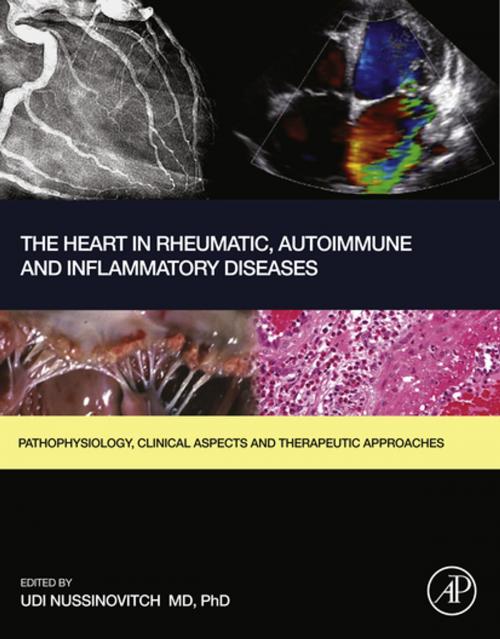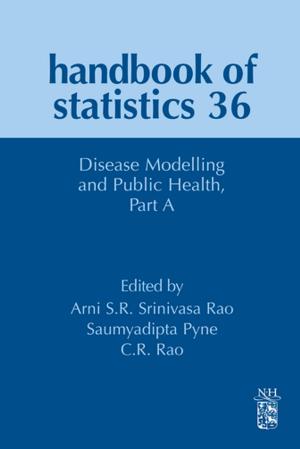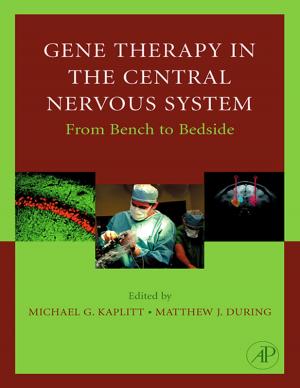The Heart in Rheumatic, Autoimmune and Inflammatory Diseases
Pathophysiology, Clinical Aspects and Therapeutic Approaches
Nonfiction, Health & Well Being, Medical, Medical Science, Immunology, Ailments & Diseases, Diseases| Author: | ISBN: | 9780128032688 | |
| Publisher: | Elsevier Science | Publication: | February 10, 2017 |
| Imprint: | Academic Press | Language: | English |
| Author: | |
| ISBN: | 9780128032688 |
| Publisher: | Elsevier Science |
| Publication: | February 10, 2017 |
| Imprint: | Academic Press |
| Language: | English |
The prevalence of autoimmune diseases and rheumatic conditions is constantly increasing. Autoimmune diseases affect approximately 7-10% of the population of the United States, while more than 50,000,000 American adults suffer from some type of arthritis. The Heart in Rheumatic, Autoimmune and Inflammatory Diseases examines the complex mechanisms relating to cardiac diseases from a pathophysiological and clinical point of view. Autoimmune rheumatic diseases can affect the coronary vessels, myocardium, pericardium, heart valves and the conduction system. The diagnosis of these unique cardiac complications necessitates medical awareness and a high index of suspicion. Increased risk of advanced atherosclerosis plays a pivotal role in the development of cardiac diseases in systemic, rheumatic and autoimmune illnesses. Yet, other complex immune medicated mechanisms may contribute to the pathogenesis. Patients' optimal care requires coordination between the primary caregiver, the rheumatologist, immunologist and cardiologist. Screening for cardiovascular risk factors, recognition of high-risk patients and identification of subclinical cardiac conditions are of great importance. Moreover, regulation of inflammation, as well as abnormal immune responses and the initiation of early treatments should be the focus of patient management. A continuous attempt to identify novel therapeutic targets and change the natural history of the underlying disease and its cardiac manifestations is in progress. The book aims at providing the readers with a state of the art collection of up to date information regarding clinically important topics based on experts' perspectives.
This book was a result of an extended coordinated collaboration of one-hundred and fifty-four distinguished scientists from thirty-one countries around the globe.
- A review of common, as well as unusual (yet clinically significant) medical cardiac complications of prevalent rheumatic, autoimmune and inflammatory diseases.
- Focuses on aspects of pathophysiological processes, clinical presentations, screening tests, prognostic implications and novel therapeutic approaches.
- Presents an up-to-date “level of evidence and “strengths of recommendations for suggested therapies and reviews all randomized clinical trials, meta-analyses and other supporting published clinical findings.
The prevalence of autoimmune diseases and rheumatic conditions is constantly increasing. Autoimmune diseases affect approximately 7-10% of the population of the United States, while more than 50,000,000 American adults suffer from some type of arthritis. The Heart in Rheumatic, Autoimmune and Inflammatory Diseases examines the complex mechanisms relating to cardiac diseases from a pathophysiological and clinical point of view. Autoimmune rheumatic diseases can affect the coronary vessels, myocardium, pericardium, heart valves and the conduction system. The diagnosis of these unique cardiac complications necessitates medical awareness and a high index of suspicion. Increased risk of advanced atherosclerosis plays a pivotal role in the development of cardiac diseases in systemic, rheumatic and autoimmune illnesses. Yet, other complex immune medicated mechanisms may contribute to the pathogenesis. Patients' optimal care requires coordination between the primary caregiver, the rheumatologist, immunologist and cardiologist. Screening for cardiovascular risk factors, recognition of high-risk patients and identification of subclinical cardiac conditions are of great importance. Moreover, regulation of inflammation, as well as abnormal immune responses and the initiation of early treatments should be the focus of patient management. A continuous attempt to identify novel therapeutic targets and change the natural history of the underlying disease and its cardiac manifestations is in progress. The book aims at providing the readers with a state of the art collection of up to date information regarding clinically important topics based on experts' perspectives.
This book was a result of an extended coordinated collaboration of one-hundred and fifty-four distinguished scientists from thirty-one countries around the globe.
- A review of common, as well as unusual (yet clinically significant) medical cardiac complications of prevalent rheumatic, autoimmune and inflammatory diseases.
- Focuses on aspects of pathophysiological processes, clinical presentations, screening tests, prognostic implications and novel therapeutic approaches.
- Presents an up-to-date “level of evidence and “strengths of recommendations for suggested therapies and reviews all randomized clinical trials, meta-analyses and other supporting published clinical findings.















